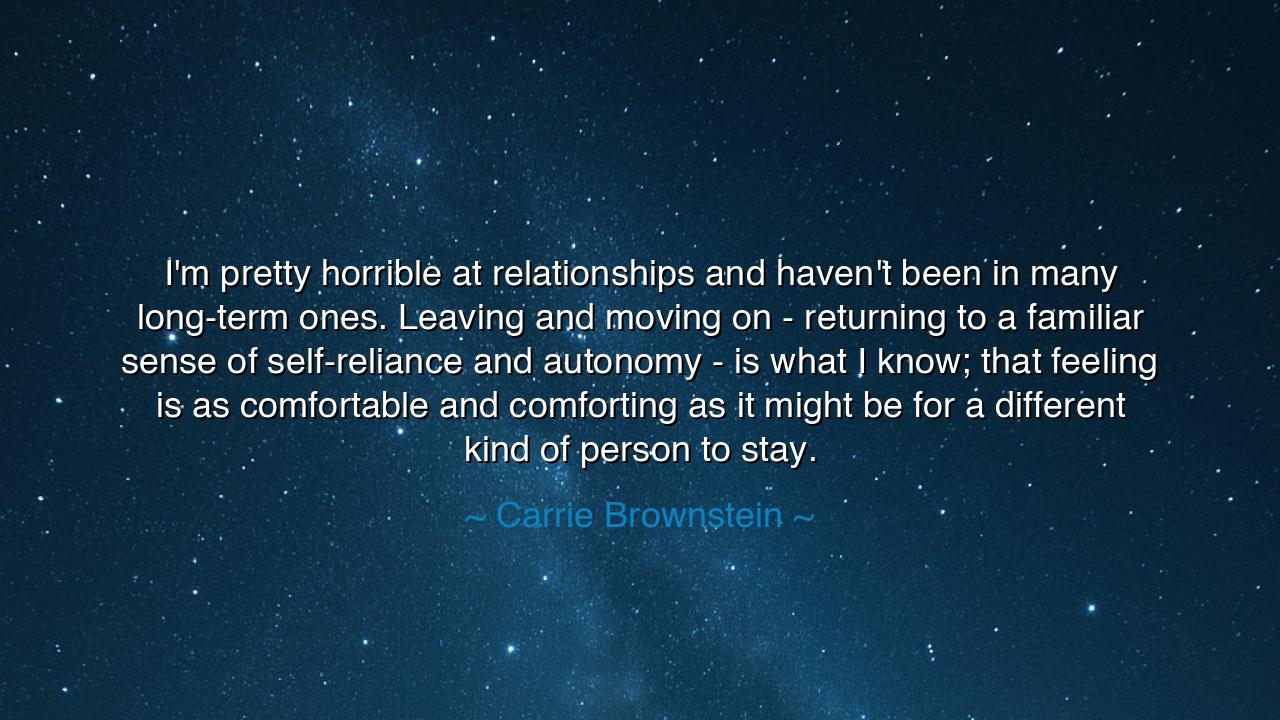
I'm pretty horrible at relationships and haven't been in many
I'm pretty horrible at relationships and haven't been in many long-term ones. Leaving and moving on - returning to a familiar sense of self-reliance and autonomy - is what I know; that feeling is as comfortable and comforting as it might be for a different kind of person to stay.






Hear the voice of Carrie Brownstein, an artist who forged her life in music and words, speaking with candor of the heart’s long wrestlings: “I’m pretty horrible at relationships and haven’t been in many long-term ones. Leaving and moving on—returning to a familiar sense of self-reliance and autonomy—is what I know; that feeling is as comfortable and comforting as it might be for a different kind of person to stay.” In this confession lies not weakness, but a rare honesty: the acknowledgment that for some, freedom is home, and autonomy is the ground upon which they most securely stand.
Self-reliance has ever been a noble quality, praised by the ancients as the fortress of the soul. To be able to stand alone, to draw strength from one’s own spirit rather than always from the company of others, is a gift and a burden alike. Brownstein reveals that what for others is the comfort of companionship, for her is the solace of solitude. Just as some find peace in the arms of another, she finds peace in her own independence. Thus, her “moving on” is not escape, but a return to the familiar hearth of her being.
The ancients spoke of this dual path often. The philosophers of Greece were divided between those who found the good life in community—like Aristotle, who praised friendship as a mirror of virtue—and those like the Stoics, who taught that true happiness must rest in one’s own self-sufficiency. Epictetus, once a slave, declared that freedom was not in the power of another, but in the mastery of one’s own will. Brownstein’s words stand within this tradition: to leave is not always to lose, but sometimes to preserve the soul’s freedom.
History gives us examples of this truth. Consider Diogenes the Cynic, who rejected attachments, wealth, and even the conventions of society. He lived in poverty, yet declared himself freer than kings, for he owed nothing to anyone. Though mocked by many, his independence became his crown. Like Brownstein, he found comfort where others would find loneliness, and his autonomy was not a punishment, but a sanctuary.
Yet her words also carry a shadow. For though autonomy is strength, it may also become armor—worn so long that the heart forgets how to be vulnerable. To confess oneself “horrible at relationships” is to admit that self-reliance, while safe, can come at the cost of intimacy. This is the paradox: what comforts us most may also keep us from growth. The solitary path gives peace, but it may also withhold the lessons only companionship can teach.
The wisdom, then, is not to condemn nor to glorify either way of living, but to recognize one’s own truth. For some, life’s anchor is found in love shared; for others, life’s anchor is found in the stillness of independence. Both are paths of dignity, if walked with awareness. Brownstein’s honesty teaches us to accept our own nature, to know where we draw strength, and not to pretend to be what we are not.
What lesson must you take, O listener? Know yourself. If you are one who thrives in self-reliance, embrace it without shame, but also remain open to growth where companionship calls. If you are one who thrives in long unions, cherish them, but do not despise those who walk alone. And above all, remember that moving on is not always weakness; sometimes it is the soul’s way of returning home to its truest ground.
Practical steps are these: learn to honor your own rhythm. If solitude strengthens you, cultivate it as a sacred discipline. If relationships sustain you, invest in them with patience. But do not measure yourself against others, for comfort comes in different forms. True wisdom is to walk the path that nourishes your soul, whether it leads you to the arms of another or to the quiet freedom of standing alone.
Thus remember Brownstein’s wisdom: autonomy can be as comforting as intimacy, and leaving can be as natural as staying. The art of life is not to live as others expect, but to live as your spirit requires—honestly, bravely, and with gratitude for the strength you have been given.






AAdministratorAdministrator
Welcome, honored guests. Please leave a comment, we will respond soon